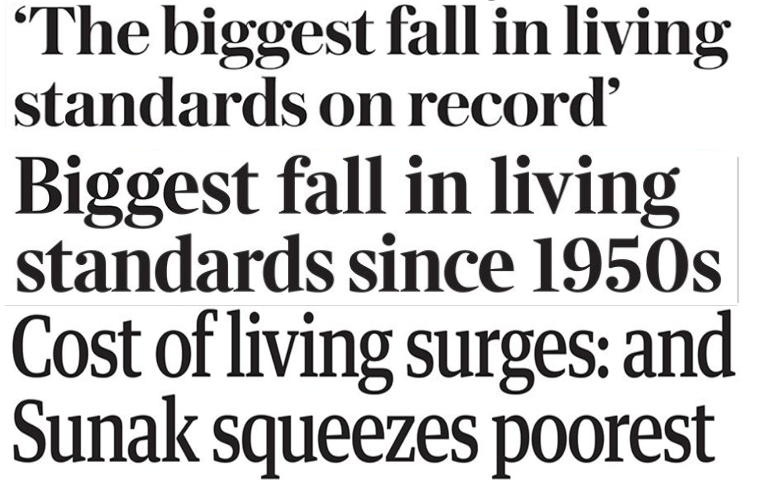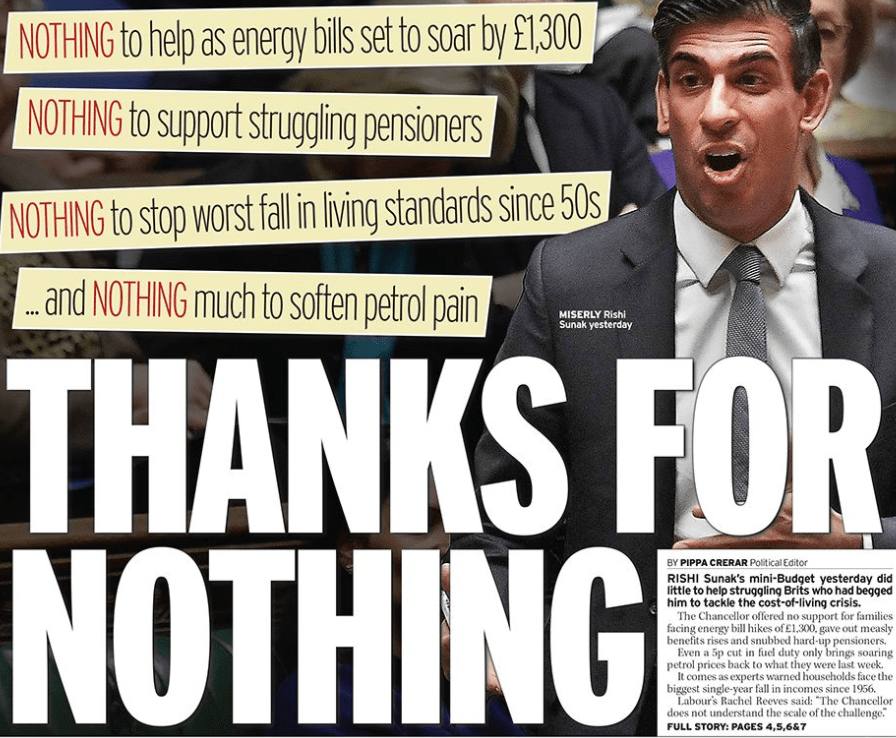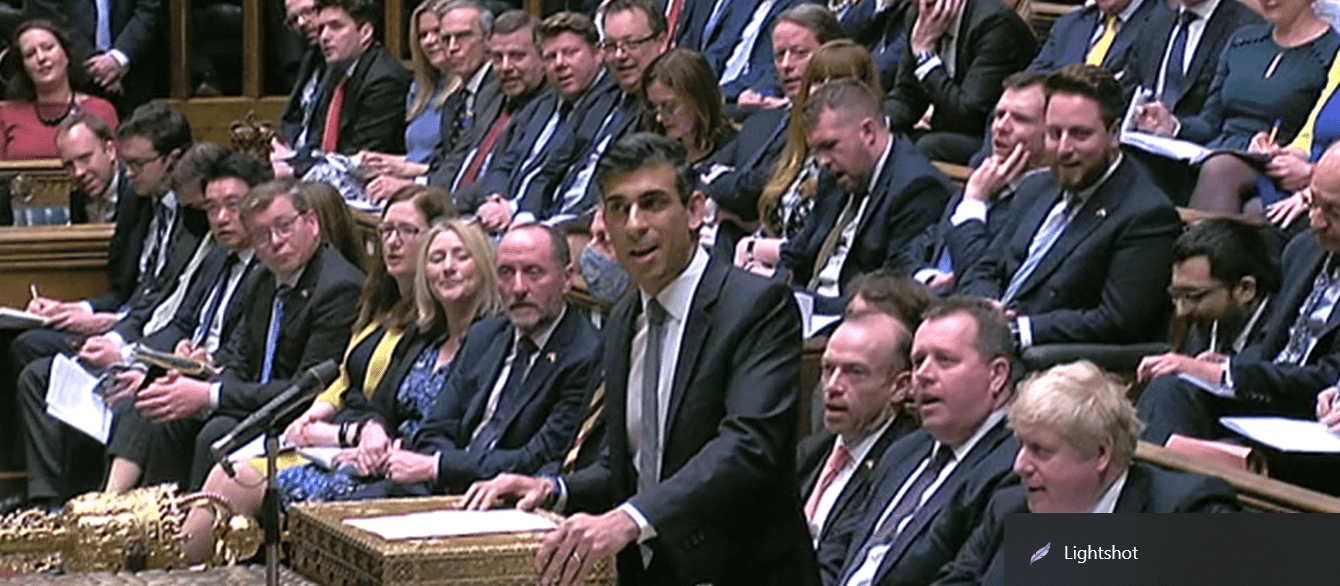Workers are facing the biggest cut in living standards on record, no small thanks to a Chancellor of the Exchequer who is personally the wealthiest MP. With official inflation figure set to rise to 9% in 2022 – in reality it is higher than that for low-income families – it will be the biggest squeeze in living memory.
The Office for Budget Responsibility, which is an arm of the government, has warned that living standards will fall in the coming twelve months at the fastest pace on record. According to the OBR, wages will not rise to their pre-pandemic equivalent for at least two years.
With the exception of a small number of workers whose trade union has fought for them a decent pay rise, the overwhelming majority of workers – especially those in the private sector – will find their pay rises are dwarfed by rising costs. The real fall in disposable household incomes will be the biggest in a single financial year since ONS records began in 1956-57. Workers who were clapped as ‘heroes’ during the Covid pandemic have again been slapped in the face.
Food banks at the very heart of government strategy
Chancellor Rishi Sunak has the gall to suggest that his modest changes to fuel duty and a rise in the threshold for paying National Insurance will mitigate the cuts in living standards. The cut in fuel duty (for a year) will not reduce petrol and diesel prices to anything like their previous levels, and many workers rely on their own cars and vans for work. In fact, according to a snap poll by YouGov, two thirds of those polled believe these ‘mitigating’ measures will either not affect them at all (24%) or will not affect them very much (42%).
Sunak claims that he has delivered “the biggest net cut to personal taxes in over a quarter of a century”, but the Resolution Foundation and the Institute for Fiscal Studies both rejected this lie. The chief executive of the Resolution Foundation, told the Financial Times that the Chancellor’s changes “do not measure up to the rhetoric”. That is certainly the experience of most workers.

Some academic studies have concluded that working class people in some cases are already in a situation where they cannot afford to heat their homes and eat at the same time. Even before the Spring statement, for example, a Northern Irish academic told the Belfast Telegraph that “the general assumption had been that those affected by the shocking hike in living costs were in a heat-or-eat scenario, when the reality is that an increasing number no longer even have that choice”.
“Destitution” he added, “is when you can’t afford to heat, eat or maintain basic hygiene, and so many people here are at that point already…People won’t be able to put a meal on the table or turn on the lights”. This is a government which puts food banks and soup kitchens at the very heart of its economic and social strategy.
Sunak has promised to reduce income tax, but not until 2024. Meanwhile, because of the freeze in thresholds, workers will be paying more income tax now. The Resolution Foundation calculates that seven in every eight working people would see tax increases rather than cuts. It calculates that only those on extremely low incomes, between £11,000 and £13,500, “would pay less in taxes on their incomes from all the measures outlined by the chancellor”. (Financial Times)
For millionaires and billionaires, of course, income tax is optional, thanks to a battery of financial arrangements, tax havens and other ‘legal’ devices available only to them. If he wanted do, Sunak could boost public finances at a stroke, by making PAYE compulsory in all circumstances – if it’s good enough for teachers and nurses, it’s good enough for company chief executives and bankers – and by legislating out of existence all the overseas tax havens that sail under the Union Jack.

Sunak the political representative of his class
John McDonnell and Jeremy Corbyn used to repeat that Tory austerity is a political choice and not an economic necessity. It certainly looks that way. But we need to remember also that Sunak is the political representative par excellence of his class – those who own and control the main levers of the economy: industry, transport, land, the energy sector, finance and banking. He and the rest of the Tory Cabinet are the custodians of an economic system that is based on greed and the enrichment of a tiny minority, and austerity from their point of view is an imperative – it is a means of shifting wealth and income from the Many to the Few.
During the Covid pandemic, the fundamental underlying policy of Sunak and Johnson was to throw dodgy contracts worth tens of billions of pounds to the friends and associates of the Conservative Party. They have blithely allowed a unprecedented degree of fraud to go on under their noses, and on such a scale that even a Tory minister in the House of Lords felt obliged to resign.
Johnson fought the 2019 election on the theme that ‘austerity is over’ and that his party was the ‘party of the workers’. These now sound like sick jokes. Workers cannot afford to put up with this rich persons’ government a moment longer.
Rachel Reeves’ message to Labour members
But unfortunately, the policy of the Labour leadership is not to stop austerity and to defend living standards, but only to soften the cuts and appear a bit better than the Tories. In her message to Labour members Shadow Chancellor, Rachel Reeves, made the point thatSunak “could have introduced a windfall tax on oil and gas producers to provide real help to families…Those who have the broadest shoulders should pay their fair share.”
This is true, but she also is doing exactly what she is accusing the Tories of doing: underestimating the scale of the damage being done to working class families. By the “broadest shoulders”, Reeves unfortunately, does not mean bankers, billionaires and other tax-dodgers, but workers who might be slightly better off.

This is a crisis of the economic system, not just a matter of misjudgement or incompetence by Sunak. No minor changes will alter the fact that it is British capitalism and not just the Tory cabinet that is responsible for the drive to impoverish the majority of the population. Sunak and Johnson may be corrupt and incompetent, but they are also following the logic of a system, whose only resort to profit is by slashing the living standards of the majority.
Workers and activists will have to fight on two fronts
Workers are going to have to fight on two fronts against the poverty being foisted on them from above. The trade unions, and above all the leadership, must adopt a fighting, militant approach to all attempts to reduce workers’ wages and conditions by fire and rehire and must rigorously pursue a policy that wins pay rises at least equivalent to the rises in the cost of living. If that means breaking the anti-union laws, then so be it. The strength of the trade union movement has always rested on its membership and not on its bank accounts.
But the active membership of the labour movement have another fight on their hands – to win back the Labour Party from its current Tory-lite leadership to policies and a programme that are genuinely in the interests of working class people. That means an unqualified defence of living standards – not merely softening the cuts – and policies of public ownership and a planned economy that can provide the economic basis for it.
*No cuts in living standards
*Wages rises to match living costs
*Abolish Universal Credit, a living wage for those on benefits.
*An immediate rise in the national minimum wage to £15 an hour, linked further to the cost of living
*An end to fire and re-hire
*Defiance of Tory anti-union laws, until such time as they are repealed.



